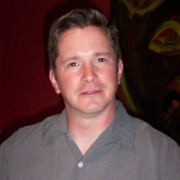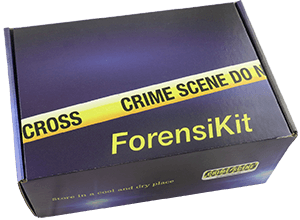
Byron Brooks interview #2
Tuesday, January 26, 2021 – 3:52 p.m.
Byron Brooks, the victim's brother, lives in Grand Junction, Tennessee, but drove to Oxford for this interview,
Detectives Armstrong and Murphy re-interviewed him at the Yoknapatawpha County Sheriff's Department.
Participants:
- Detective T. Armstrong
- Detective S. Murphy
- Byron Brooks
Byron Brooks: Byron Brooks, 436 Adams, Grand Junction, Tennessee. I left work as soon as I got your message. Has something happened?
Detective Murphy: Take your time, Mr. Brooks. Can I get you something to drink? Water?
Byron Brooks: No, thank you.
Detective Murphy: So that was your Lexus SUV that pulled into the lot?
Byron Brooks: Yes.
Detective Murphy: Nice. That's what I'd get if I had the cash.
Byron Brooks: We've been lucky.
Detective Murphy: You could say that.
Detective Armstrong: We wanted to verify a couple of your statements from the last time we talked.
Byron Brooks: Couldn't we have done this over the phone? Mother is really struggling.
Detective Murphy: I'm sorry.
Detective Armstrong: You said you were here in Oxford on Saturday, right?
Byron Brooks: Yes, correct. I drove down and arrived around noon, and when I hadn't reached Spenser a few hours later, I went home.
Detective Armstrong: And you didn't see anybody here you knew?
Byron Brooks: No.
Detective Armstrong: Did you visit Wall Doxey Park that day?
Byron Brooks: No. We discussed this before, didn't we?
Detective Murphy: You didn't meet Debra Lane?
Byron Brooks: Who?
Detective Murphy: Did you see Christy Arnold?
Byron Brooks: No. I don't know who that is.
Detective Murphy: Did your brother ever mention someone by that name?
Byron Brooks: No.
Detective Murphy: What about Hector Daniels?
Byron Brooks: Hector? I'm sorry. Aside from The Iliad, I'm drawing a blank.
Detective Murphy: You don't know him, or you don't recall seeing him that day?
Byron Brooks: Both. Look, I'm not sure where you're heading with all this, but it seems like you think I'm hiding something. I told you everything I could about that day. I believe I'm the one who volunteered the information that I was even here. Why would I do that if I had something to hide?
Detective Armstrong: Have you ever been in Cabin 7 at Wall Doxey?
Byron Brooks: Ever? Maybe.
Detective Murphy: How about lately?
Byron Brooks: I don't think so.
Detective Armstrong: See, we have information that you were in that cabin recently.
Byron Brooks: That's impossible. I told you I didn't stop at the park on Saturday.
Detective Murphy: But you've been there before.
Byron Brooks: Yes. I said that last time, too. I'm sorry. I think it would be easier if you just asked outright what you're hoping to discover.
Detective Murphy: Would it?
Detective Armstrong: Mr. Brooks, when were you last at Wall Doxey Park?
Byron Brooks: December 12.
Detective Armstrong: What were you doing there?
Byron Brooks: I got together with some friends.
Detective Armstrong: Really? That sounds nice. Which friends?
Byron Brooks: Sorry?
Detective Armstrong: Which friends? We'd like to talk to them.
Byron Brooks: Okay, you got me. They're some people I had played poker with online. We got together for a friendly game in one of the cabins. I suppose it could have been in Cabin 7, but I'm sorry, I don't remember, and I didn't write it down.
Detective Murphy: Why didn't you tell us this before?
Byron Brooks: You didn't ask. I told the truth about everything you asked.
Detective Armstrong: So you were being honest when you said you didn't know which park Wall Doxey was? Thinking it was the other side of the highway near Sardis Lake?
Byron Brooks: Yes, that's the truth. I'm sure you've done it, too—driven roads so many times you don't even see the details anymore. When I went to the poker game, I had to use a navigation app because I couldn't remember where to go.
Detective Armstrong: You couldn't remember where the park was that you drive by every time you go back and forth between your home and Oxford?
Byron Brooks: I don't make that trip too often now that Mother lives with me. And I told you I wasn't outdoorsy when I lived here, and that was the truth.
Detective Armstrong: So back in December, you used your navigation app to get to the park you've driven past hundreds of times—
Byron Brooks: I wouldn't say hundreds.
Detective Armstrong: What would you say?
Byron Brooks: Dozens?
Detective Armstrong: Okay, you used your navigation app to get to the park you've driven past dozens of times. Then what?
Byron Brooks: Then nothing. When I got home, I just deleted the trip from the history and moved on. The name of the park wasn't important to me. Everything I've told you is the truth. Believe me.
Detective Murphy: Okay, then let's try another one. You said you don't know Debra Lane.
Byron Brooks: That's correct.
Detective Murphy: Then why don't you tell us how you came to be part of that poker game.
Byron Brooks: I'm sorry, but what does this have to do with my brother? That game was back in December. Spenser wasn't there, and it wasn't something we ever discussed.
Detective Murphy: Now it's your turn to believe me. We just need to know.
Byron Brooks: All right. Fine. It's not a big secret. At the poker site where I play, there's a private club for Oxford. Actually, it's mostly Ole Miss alumni, not necessarily still in Oxford, and there are some other local people too.
Detective Murphy: And the poker game in December?
Byron Brooks: Last summer, one of the members—I don't remember who—suggested we have a meet-up. Eventually, we decided to have games in person once a quarter or so. The one in December was the first.
Detective Murphy: Were you responsible for organizing that?
Byron Brooks: No. Someone with the screen name DLane set it up, but I don't know if that's a real person or not. DLane wasn't there the day we had the game. They just made the arrangements.
Detective Murphy: Was DLane paid to do this?
Byron Brooks: Yes. Twenty-five bucks per player.
Detective Armstrong: That sounds steep.
Byron Brooks: Well, we each staked $250, so it's ten percent, and for that, we had the cabin and food.
Detective Armstrong: So, not so much a friendly game since you were playing for real money.
Byron Brooks: It was friendly. Nobody was overly serious or upset about the outcome.
Detective Armstrong: Especially not you, right?
Byron Brooks: What is that supposed to mean?
Detective Armstrong: Does your wife know about your poker habit?
Byron Brooks: Hannah knows I play. In fact, she controls how much money is in the online account. We budget a couple of grand a year, nothing major. I only bet what I'm comfortable losing.
Detective Murphy: Who was at that game?
Byron Brooks: Myself and seven other men. I don't know their full names: someone named Danny, and a guy who went by Chet. There was Raymond, Bill, and … okay, there was a Hector there. I remember now. When I think about it in this context, I remember. I wasn't lying before.
Detective Murphy: What about the two others?
Byron Brooks: I don't remember.
Detective Murphy: Was your brother there?
Byron Brooks: I said before that he wasn't.
Detective Armstrong: Was this game legal?
Byron Brooks: How should I know? I'm sorry, but I'm not as obsessed with the rules as Spenser was. To me, it was a harmless poker game. Everyone was perfectly civilized about it. If it's illegal, it makes no sense. Why shouldn't I be able to lose my own money if I want to? Why should I have to go to a casino to do it?
Detective Murphy: Did you lose?
Byron Brooks: As a matter of fact, no. I won.
Detective Murphy: What did you do with the money?
Byron Brooks: I put it toward the second mortgage I told you about before, for Mother's hospital bed. We've been stretched pretty thin.
Detective Murphy: Really? I thought you made a pretty good living.
Byron Brooks: I know it sounds ridiculous, but the more money you have, the more ways you find to spend it. With Belen's education fund, the donations we make to the orphanage in Jalapa, and Hannah turning down work to help with Mother … well, we're not suffering, but we have to watch it.
Detective Murphy: Did you declare the income from that game?
Byron Brooks: Not yet.
Detective Murphy: When was the next poker game after that?
Byron Brooks: We haven't had one. We talked about April or May, but we don't have anything definite planned.
Detective Murphy: Did any of the other players mention your brother?
Byron Brooks: No. Why would they?
Detective Murphy: Did Virginia know about the game?
Byron Brooks: No. That's ridiculous.
Detective Armstrong: You didn't see your brother that day of the poker game?
Byron Brooks: No.
Detective Armstrong: And you're sure you didn't have a game last Saturday?
Byron Brooks: Of course, I'm sure. I'm sorry, but this line of questioning is a bit simplistic. Just because I was once in the park and apparently in the cabin where Spenser died, and just because he's my brother, you're seeing some kind of connection that doesn't exist. It's a coincidence.
Detective Armstrong: We'll see.
Byron Brooks: What else can I tell you? I may not have liked my brother, but I would never have hurt him. I don't believe violence solves anything.
Detective Murphy: Mr. Brooks, was anyone at that poker game connected with your brother? Maybe someone he prosecuted?
Byron Brooks: How would I know? I don't judge people by their appearance if that's what you mean. They all seemed perfectly decent to me.
Detective Murphy: Your brother's name never came up in conversation?
Byron Brooks: We didn't really have conversations. We chit-chatted about football, TV shows, what people were doing for the holidays, things like that. It wasn't the kind of discussion where anyone would bring up whether they had a criminal record or not. And no one mentioned Spenser, as I've already said.
Detective Murphy: Were any of the people there connected to your work?
Byron Brooks: No.
Detective Murphy: Anyone you'd seen before or since?
Byron Brooks: No. Are we nearly done here? This is becoming ridiculous.
Detective Armstrong: That depends. Is there anything else you have to say for yourself?
Byron Brooks: Are you any closer to finding his killer?
Detective Armstrong: Maybe.
Byron Brooks: That's very reassuring. I'd think you'd be more interested in finding out who shot your colleague to death.
Detective Armstrong: If I were you, I wouldn't make assumptions about our level of interest in arresting anyone and everyone involved in Spenser's murder.
Byron Brooks: Why not? You're making all kinds of assumptions about me.
Detective Murphy: Mr. Brooks, you can go now. Thanks for coming down. We'll be in touch.
Interview ended – 4:31 p.m.
Useful Links
Login
Contact
Crime Scene
3602 N 16th St
Phoenix, AZ 85016
Voice (623) 565-8573
Fax (602)-274-7280
For Crime Scene Store inquiries: store@crimescene.com
For technical assistance: support@crimescene.com

